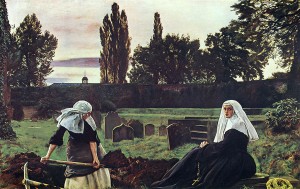 Editors’ Note: This article is part of the Patheos Public Square on Remembering the Dead: Ancestors, Rituals, Relics. Read other perspectives here.
Editors’ Note: This article is part of the Patheos Public Square on Remembering the Dead: Ancestors, Rituals, Relics. Read other perspectives here.
Dressed against the cold October wind, a woman stands before the gravesite of her departed son. She has made a bouquet of blue and yellow flowers and attached to it a birthday card. She places these in the vase above the grave marker. Orange and red leaves fly about her, gathering around the stone and marble. Thunder rumbles. In the approaching autumn storm, the ink on her card will run and fade, but her words to her son will remain.
In a church nearby, a priest offers a Mass for his mother, whom he laid to rest ten years ago to the day. He chokes up while praying the intentions. The few parishioners in attendance know what this day means to him. He often speaks of his mother, sharing her story with friends and parishioners; and he never goes a day without speaking to her, asking for her prayers and intercession. Even people who never met her feel that they know her. The priest’s stories have creative power.
Among the parishioners in attendance, a young mother holds her newborn and thinks of her best friend who had called her that morning at 4:00 am. Her friend has inoperable cancer and will be gone from her life in a matter of weeks. She has asked her to speak at the funeral, if she can. As the priest says the words of consecration, she wonders what she will say, how she will honor her friend. No words or ideas come to her now. She holds her sleeping baby close, feeling the child breathing peacefully against her. She will compose something later.
We Catholics believe that life continues after death and that those who love as they ought will find eternal peace. Nevertheless, death hurts so, so much. We fear it. We grieve and we mourn. We struggle to make sense of it all. We have our bad days and really bad days. Sometimes we don’t find any comfort or consolation, even when we turn to God’s heavenly promises. My wife and I lost a newborn a few years ago. When I pray in memory of our daughter Vivian, I’m not filled with comfort and I don’t find myself much consoled. My faith doesn’t diminish the pain, but it helps me make sense of the loss.
I say “make sense” because the loss itself has no sense. At least, I find no sense in it. I can’t tell you why she had a fatal condition. I can’t reconcile her death with the idea of a kind and compassionate God. It all seems so brutally absurd. If there is meaning to her death, I will have to wait until my own passing to find out what that is. In the meantime, I do what I can to make her short life and her passing meaningful to me and to others. If I can’t find meaning, I will create it.
Fortunately, I do not have to be creative alone. The Church provides me and others who grieve with special rituals and remembrances for relating creatively to those we’ve lost. We have Masses said for their intentions. We pray to them for guidance and aid. We ask God to bless them. We may only repeat the words of others, but by saying them we make them our own. They become meaningful to us and something new.
Sometimes we hold on to little things that keep them alive to us in a big way. When we lost Vivian, we kept some her clothes—the few garments she was able to wear. Like the pictures we have displayed in our home, these small relics help keep her close to us and real to us. We can’t touch her anymore, but we can touch the fabric that covered her skin and kept her warm. We see something of her every day, and so every day she is present to us. These reminders help me imagine her with us, playing Ninja LEGO Hello Kitty with her siblings, watching quietly as my wife paints, or standing on a chair next to me while I type, looking over my shoulder and pointing out typos.
We Catholics do not believe that our prayers and hopes are all made up, as if they were make-believe and we are merely fooling ourselves into following some fiction. However, our words and rituals for those who have died are creative: a uniquely meaningful relationship grows from them. The dead stay with us. In a way, they are physically alive before us because we make them present by what we do. Our remembrances can be a resurrection, unreal and real at the same time. I cannot imagine life without my family and friends, but at the same time I cannot imagine prayer and hope without Vivian. She remains as real to me as anyone.
Kyle Cupp is the author of Living by Faith, Dwelling in Doubt. Follow him on Facebook and Twitter.












